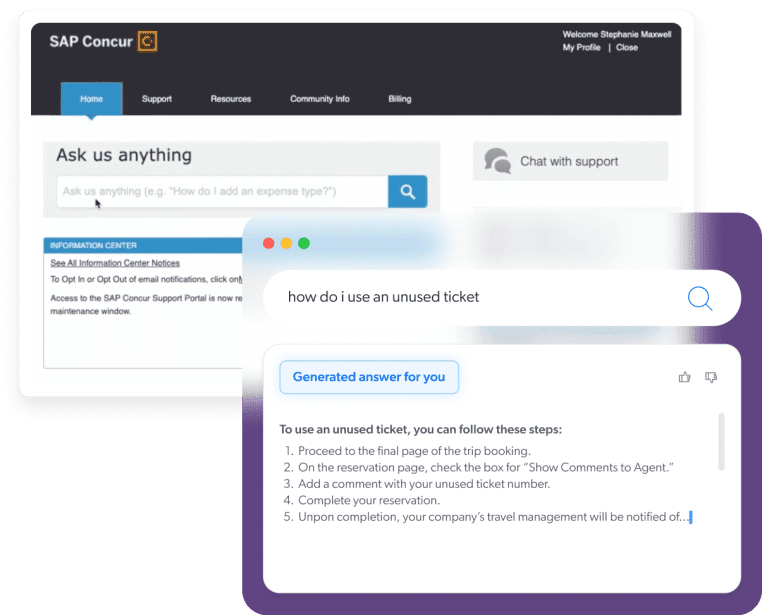Picture this: A procurement manager at a Fortune 500 company urgently needs to resolve an issue with their expense management software. After navigating a clunky interface and waiting on hold for customer support, they abandon the platform entirely, escalating the problem to leadership and fueling dissatisfaction with the vendor. In another department, a sales executive, racing to close a deal, struggles to find product specs buried deep in an outdated portal — costing valuable time and possibly the sale. And while a marketer grapples with the company website to ensure current and accurate information is available, the tool that surfaces that content to prospects is limited to keyword matching — meaning site visitors must know what they’re looking for and miss out on what they’re not aware of.
These aren’t hypothetical scenarios; they’re real-life examples of how breakdowns in the digital customer experience (CX) can damage even the strongest B2B relationships. For enterprise-level customers, time is money, and inefficiencies in digital experiences directly affect the bottom line.
But what if these moments of friction were replaced with seamless, personalized solutions — all underpinned by a single platform? What if AI could anticipate customer needs, resolve issues in real time, and create effortless interactions regardless of digital touchpoint?
For many enterprise companies today, this isn’t a vision — it’s their competitive edge. By leveraging AI, modern organizations are turning digital challenges into opportunities for loyalty, efficiency, and growth. Celebrated CX thought leader Blake Morgan recently joined Coveo for their Masterclass in AI series to discuss real-world examples that other organizational leaders can adapt for their own digital customer experience strategy.
Why a Consistent Experience Is Mission-Critical
Digital transformation has fundamentally shifted how businesses interact with customers. Today, digital customer experience is about more than just optimizing a website or app — it’s about building seamless, personalized interactions across every customer journey touchpoint. From mobile apps to chatbots and self-service portals, customers expect businesses to meet them where they are and deliver consistent value.
The stakes are high. Research shows that 76% of consumers become frustrated when their experiences aren’t personalized. Morgan underscored this sentiment:
“Customer experience is not a discipline; it’s a decision.”
And this decision is increasingly made at the intersection of technology and human engagement. Consider the story of Air Canada as a cautionary tale. A grieving customer, needing to attend a funeral, reached out to the airline’s chatbot for help with a bereavement fare. The chatbot assured him he could receive a refund after the flight. However, when he returned and contacted the support center, a live agent informed him the chatbot had provided incorrect information — and the refund wouldn’t be honored. The fallout wasn’t just a refund dispute; it became a public relations disaster. The misstep highlighted how critical it is for enterprises to ensure their overall customer experience is accurate, empathetic, and aligned across all channels.
In contrast, enterprises that prioritize DCX are seeing tangible results. For example, Coveo’s AI-powered solutions helped SAP Concur reduce support case submissions by 31% per 1,000 searches. These efficiency gains translate directly into cost savings and improved customer satisfaction — both critical metrics in today’s competitive landscape.
Relevant reading: How SAP Concur Reduced Case Volumes by 31% with GenAI
Coveo calls it the AI-experience advantage: the ability to deliver personalized, relevant, and seamless interactions at every touchpoint. This approach not only enhances the digital customer experience but also drives measurable business outcomes, such as:
- Higher customer satisfaction (CSAT) scores.
- Increased case deflection rates.
- Significant cost savings from reduced support volumes.
The Role of AI in Digital Customer Experience
AI is reshaping how businesses deliver DCX by providing the tools to meet rising customer expectations at scale. Here are three core ways AI enhances digital customer experiences:
1. Personalization at Scale
In both B2C and B2B, personalization has become the new baseline for exceptional digital customer experiences. A McKinsey study revealed that 71% of consumers expect personalized interactions, and companies that fail to deliver risk losing their customers. AI enables businesses to meet these expectations by analyzing customer data in real time to deliver tailored recommendations, content, and services.
During the masterclass, Blake Morgan highlighted the success of KLM Royal Dutch Airlines in using AI to drive personalization at scale. KLM leverages AI to power its messaging systems, including WhatsApp, where customers receive flight updates, check-in notifications, and boarding passes in real time. This service also allows customers to ask questions and receive personalized assistance directly within the app, offering a seamless, tailored experience.
For example, if a frequent flyer books a flight, KLM’s AI systems ensure that all their preferences — seat selection, meal choices, and even their preferred communication language — are accounted for and reflected in the interaction. This proactive personalization helps KLM not only meet but exceed customer expectations, strengthening loyalty and enhancing the overall digital customer experience.
This kind of AI-powered personalization doesn’t just improve operational efficiency — it builds trust and creates memorable experiences that customers value.
2. Streamlining Operations for Efficiency
AI excels at managing high volumes of customer interactions without compromising quality. This capability is essential as digital transformation drives more customer engagement online, placing pressure on businesses to deliver consistent, efficient experiences.
Companies like Coveo are helping enterprises to harness the power of AI to automate and optimize support services while maintaining exceptional quality. A great example comes from Coveo customer United Airlines, which implemented Coveo’s AI-driven solutions to improve search relevance across its customer service platforms. By using Coveo’s technology to power their self-service touchpoints, United was able to reduce customer inquiries stemming from incomplete or inaccurate information. The system helped customers find answers faster, preventing the creation of unnecessary support tickets and significantly decreasing operational strain on their contact centers.
The results? Fewer escalations to live agents and a smoother journey for customers — ensuring operational efficiency while ensuring customer retention. For enterprises, such outcomes don’t just save time and money; they enhance brand trust and loyalty by delivering on the promise of a seamless digital customer experience.
3. Connecting the Employee Experience for Exceptional Service
Adopting new technologies can revolutionize how employees work, but it’s not always a smooth transition. Resistance to change is a common hurdle, even when the tools are designed to make work easier. During the masterclass, Morgan shared an insightful example of how employees in a contact center pushed back against a new AI-driven system designed to improve efficiency.
The technology in question automatically generated call summaries after each customer interaction — a task that agents had previously done manually. While the tool saved time and increased productivity, it also removed what employees viewed as their “breather” time between calls. These brief moments of downtime were essential for managing stress and preparing for the next customer, and their loss led to resentment toward the new AI tool.
This example highlights an important truth: even the most helpful technologies can face rejection if they’re not implemented with employee needs in mind. Effective adoption requires not just introducing tools but managing the human side of change. Organizations need to invest in thorough training, foster open communication, and involve employees in the deployment process to ensure the tools are seen as empowering rather than disruptive.
Relevant reading: 12 Generative AI Skills Needed for the Future of Work
Morgan emphasized the importance of leaders engaging directly with AI to understand its capabilities and potential: “For us to be experts at AI, we have to play with the AI ourselves. That’s why I encourage everyone to explore tools like ChatGPT or other AI applications. It’s not just about understanding the technology — it’s about finding the gaps, identifying where it works, and where it doesn’t.
“Leaders need to roll up their sleeves and experiment to truly grasp how it can transform their businesses.”
By addressing these challenges head-on, businesses can create an environment where employees feel supported and engaged, ultimately enhancing both their satisfaction and the digital customer experience they deliver. After all, empowered employees are the cornerstone of exceptional service.
Challenges in Implementing AI for Digital Customer Experience Strategy
While the benefits of AI in customer experience are clear, implementing it effectively requires overcoming several challenges:
1. Data Quality and Integration
AI is only as good as the data it uses. Fragmented systems and siloed data can lead to poor insights and inconsistent experiences. Juanita Olguin of Coveo advises businesses to focus on data accuracy and seamless integration to unlock the full potential of AI.
Relevant reading: Data Cleaning Best Practices for Enterprise Success
2. Balancing Digital Technology with Empathy
While AI can handle routine tasks and scale interactions, maintaining a human touch is essential for building trust. Companies must design their AI systems to complement, not replace, human engagement. For example, AI can offer service convenience for known issues, leaving employees free to focus on more complex or emotional customer needs.
3. Change Management
Adopting AI requires cultural and organizational shifts. Employees need training and support to integrate AI into their workflows effectively. Businesses that invest in change management and foster a supportive AI culture see higher adoption rates and better outcomes.
Make Digital Customer Experience Your Competitive Edge
The digital customer experience is more than a buzzword — it’s the foundation of modern business success. By leveraging AI, companies can create personalized, efficient, and scalable interactions that meet and exceed customer expectations. As the examples from Fortune 100 companies show, the rewards of investing in DCX are substantial: improved customer loyalty, lower costs, and a stronger competitive position.
Are you ready to elevate your digital customer experience? Explore how AI can transform your business.
Dig Deeper
Watch the whole CX Masterclass to get insights from CX futurist and best-selling author Blake Morgan.



